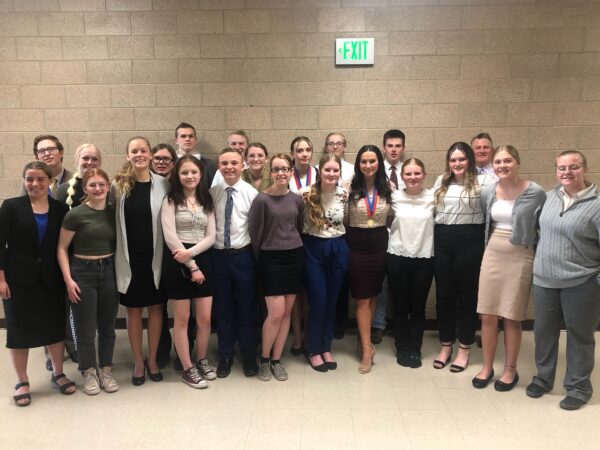As an incoming freshman, picking which classes or clubs you’d like to participate in can be extremely overwhelming — as if the transition from junior high isn’t already stressful enough. For me, this process was exactly that: overwhelming. Among the many options available for students, one that eventually sparked my interest was speech and debate.
I originally took speech and debate for one reason only: it meant I wouldn’t have to take a twelfth grade English course. However, after joining the debate team, I realized very quickly that it meant far more to me than I had ever anticipated. A class that I initially took to avoid twelfth grade English turned into a passion — one that I still carry a deep love and appreciation for.
Categories in Speech and Debate
Many categories are offered that allow participants to showcase their talents. The National Speech & Debate Association offers the following descriptions of each category available in 1A state tournaments:
- Lincoln-Douglas Debate: “a competitive speaking activity that involves two debaters arguing for and against a resolution.”
- Public Forum Debate: “a two-on-two team debate. Teams debate each other on a predetermined resolution that is based on current events.”
- Congressional Debate: ”Congressional Debate is a mock legislative assembly competition where students draft bills (proposed laws) and resolutions (position statements), which they and their peers later debate and vote to pass into law and then take action on by voting for or against the legislation.”
- Extemporaneous: “the art of giving speeches on the spot — without notes or memorization — relying only on the speaker’s depth of knowledge and their ability to explain what they know in a coherent, engaging manner.”
- Original Oratory: “students deliver a self-written, ten-minute speech on a topic of their choosing. Competitors craft an argument using evidence, logic, and emotional appeals. Topics range widely, and can be informative or persuasive in nature.”
- Impromptu: “a public speaking event where students have seven minutes to select a topic, brainstorm their ideas, outline and deliver a speech. The speech is given without notes and uses an introduction, body, and conclusion. The speech can be light-hearted or serious.”
- Spontaneous Argumentation (SPAR): “students have limited time to do three things: construct a case on either the affirmative or negative side, question an opponent, and then refute an opponent’s case.”
Speech Is Power
Ralph Waldo Emerson once said, “Speech is power: speech is to persuade, to convert, to compel.” This statement is so true! Debate allows participants the opportunity to share that which they are most passionate about — to “persuade, convert, and compel.”
Under the direction of a coach whom I admire, Mr. Ryan Houston, my team and I worked together to win a state championship and supported one another in individual titles as well. Through my four-year participation, I was able to develop many attributes that helped and continue to help me in my everyday life. Along with my teammates, I learned organization, time management, responsibility, and accountability — while also developing crucial writing and public speaking skills.
At each region and state tournament, the Panguitch debate team joins together and does the following cheer: “Uno … dos … tres … tough as nails!” Not only is this a fun tradition, but it provides the motivation to be exactly that.
So, when taking into consideration all the options for clubs, teams, or classes in the coming school year, I would highly recommend allowing yourself the opportunity to participate in speech and debate!
– by Hailee Eyre
Feature image caption: Panguitch’s debate team winter 2022 speech and debate team at state.

Hailee Eyre – Panguitch
Hailee Eyre is a journalist at The Byway. She attended Southern Utah University in the fall and is pursuing a career in the medical field. Her favorite topics to write about are those that intend to inspire others, providing motivation as means to better yourself or the world around you. In her free time, Hailee loves to be outdoors, whether it be hunting, fishing, boating or hiking.
Hailee is currently serving a mission for the Church of Jesus Christ of Latter-day Saints in the Pennsylvania and New York Church History Sites Mission.

